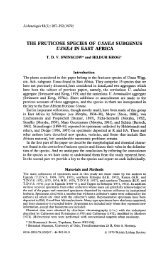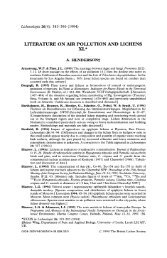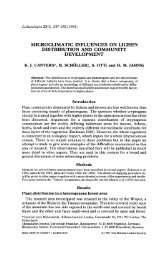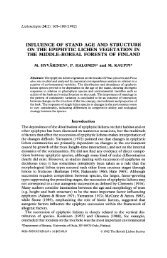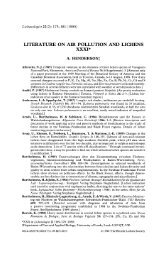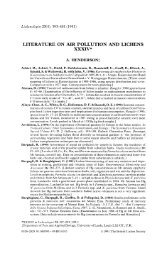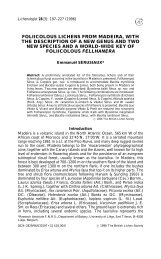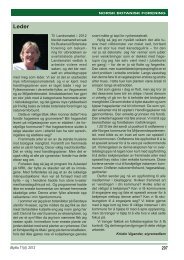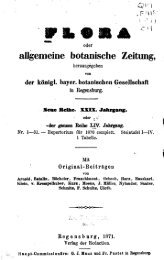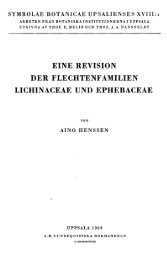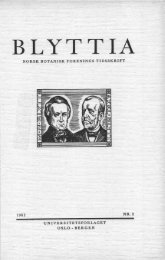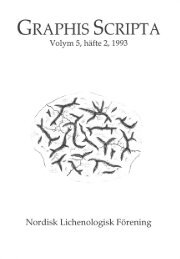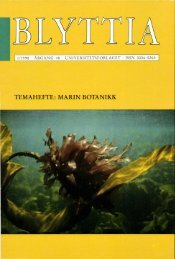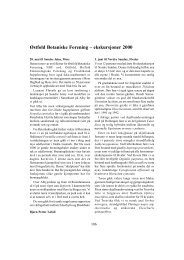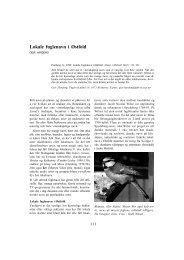British Museum (Natural History)
British Museum (Natural History)
British Museum (Natural History)
You also want an ePaper? Increase the reach of your titles
YUMPU automatically turns print PDFs into web optimized ePapers that Google loves.
ERIK ACHARIUS AND HIS INFLUENCE ON ENGLISH LICHENOLOGY 165<br />
remarks on Lichens, but do not blame me if my opinion on speculative points differs sometimes from<br />
yours. Neither dare I change names so freely as you have done. I must keep in view those Laws of<br />
Linnaeus which are sanctioned by experience and founded in justice. If you and I do not follow his<br />
good principles how can we call others to account? The great Hedwig shall never lead me to use the<br />
unnecessary word sporangium for capsule. It is easy enough to invent new words. Genius appears<br />
best in using old ones properly. I dare not change Umbilicaria for Gyrophora though I should have<br />
preferred the latter at first. I beg to observe that Lichen pustulatus is a true Gryophora. I regret that<br />
there should be a word in your excellent book that I cannot zealously defend as a friend ought: but I<br />
know we cannot all think alike in philosophy any more than in religion . . .<br />
I will propose to the Linnean Society to exchange Their Transactions for something you send. The<br />
Linnean Society will be very thankful for any manuscript dissertation of yours for their Transactions.<br />
Thank you for your kind enquiries - my health is now restored I had a long illness.' (Smith, 1804).<br />
Dawson Turner, more highly enthused by Acharius's new work than Smith, wrote to Swartz:<br />
'I have just been fortunate enough to procure for myself a copy of Dr Acharius's Methodus, and<br />
have been arranging the greatest part of my Lichens by it. I agree in great<br />
measure with his<br />
distribution of the genera, and his remarks as to many of the species have very much pleased me. He<br />
is however frequently mistaken about the <strong>British</strong> Lichens, as I shall be happy to convince him,<br />
will enter into a correspondence with me. You will probably have the goodness to furnish him with<br />
my direction, and tell him I shall be much pleased to be favoured with a letter from him, indeed I<br />
would write myself but in his present domestic affliction I too justly fear it might be deemed an<br />
intrusion. Pray can the papers he has published in your Nov. Acta be procured? Of these I have the<br />
15th, 16th and 17th volumes; all the 18th except the Numbers for July, August and September; and<br />
all the 20th except the last number: could you procure me the rest of Dr Acharius's papers, I would<br />
repay the expense involved with a great many thanks. I see by his Methodus that I want all your West<br />
Indian Lichens, but on the other hand I possess a considerable number that he has not included, and<br />
should I, which I still hope, be fortunate enough to obtain Dickson's collection, I shall be rich indeed<br />
in new ones. Even if I fail in this expectation, I am sure Sir Jos. Banks will supply me with all that<br />
may arrive hereafter. I am ignorant how readily English books find their way to Stockholm; but I<br />
trust if any Botanical publications that would interest you, should appear here, and you be at a loss<br />
to procure them, you will never hesitate to apply to me, but be assured that the making me useful to<br />
you is one of the greatest kindnesses you can confer.' (Turner, 1804d).<br />
Swartz, writing to Turner on the same day as the preceding letter, answered a number of<br />
Turner's queries:<br />
'Besides some species of mosses there is also a letter from Prof. Acharius, who salutes you most<br />
earnestly and wishes your future acquaintance. He certainly can provide you with some that are out<br />
of my reach. He works constantly on the further accomplishing of his Methodus - that he sometimes<br />
has been mistaken in regard to English species he knows very well, but this he will acknowledge and<br />
correct in future. (Swartz, 1804ft).<br />
That Acharius had a strong advocate for his taxonomic views in Dawson Turner can be seen<br />
from extracts from the latter 's publications dating from this time, and in the following letter to<br />
Swartz:<br />
'I cannot tell you how much pleasure I have received from your letter of the 14th December, [not<br />
preserved in the Turner correspondence in Trinity College Library, Cambridge] which has just<br />
reached my hands, and which I hasten immediately to answer, wishing very much that the<br />
than it has even hitherto been . .<br />
correspondence between us should grow far more frequent .<br />
I particularly lament the detention of Dr Acharius' letter, and wish it had been sent by post, for I<br />
am anxious to have a communication with him: especially as I am about to describe several new<br />
Lichens for our Linnean Society, and have been particularly attracted to these plants lately. I am<br />
very much pleased with the outline of his new Genera, but there are parts I wish altered, and also I<br />
regret his having used so much Greek, for we in England we are not scholars enough to comprehend<br />
the meaning of his names of them and certainly far from evcpwvoi. At the request of Mr Konig I<br />
wrote a hasty critique upon his Methodus for the second number of the Annals of Botany.' (Turner,<br />
1805).<br />
Although Konig & Sims (1804) presented a synopsis of the Methodus in their literature review, it<br />
was left to Turner (18046) to publish the first considered examination of the work in an English<br />
if he



